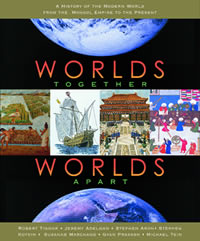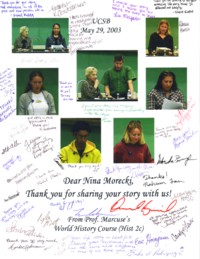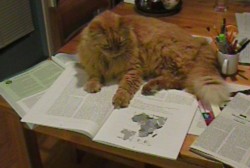Announcements
(old announcements move to bottom)
- March 5, 2006: Course books.
 In
case you want to try to get a head start or save some money ordering
the course books on-line or used, these are the three required books: In
case you want to try to get a head start or save some money ordering
the course books on-line or used, these are the three required books:
- Textbook
Tignor et al, Worlds Together, Worlds Apart (Norton, 2002)
($35/78
at amazon)
- Mary Lynn Rampolla, A Pocket Guide to Writing
in History (Bedford, 4th edition 2004)($9/14
at amazon)
- Robert Allison (ed.), The Interesting Narrative
of the Life of Olaudah Equiano: Written by Himself (Bedford,
1995; written 1789)($5/14
at amazon)
- 3/23: UCen bookstore has about five used copies for $9, lots of new for $14 plus tax.
- Feb. 22, 2006: Crashing/Wait List. The Spring 2006
course filled up on Feb. 16, and several students have contacted me
about how they can get in. Unfortunately, until the first class meeting,
there is nothing I can do for you--you just have to keep checking on
GOLD and register when you find an open space. On the first day of class
I will freeze enrollment and then TAs can start waiting lists for any
spaces that open up. I WILL ask them to give priority to certain students.
My thinking at this point is:
- First, students (esp. history majors) who have
already taken 2A and 2B
- Second just 2B
- Third just 2A
- Then any other students who can make a reasonable
argument that they are a hardship case. I note that Hist 4B and
4C are also offered this spring, and Hist 2C (I'm pretty sure) will
be offered in summer sessions.
- March 23, 2006: TA Section Assignments
- Rafaela Acevido-Field: W 4-5, 5-6; F10-11
- Ricardo Caton : W 1-2, 2-3; F 12-1
- Laurence Christian: W 6-7 plus 2CH TBA
- Mary Donaldson: F 8-9, 9-10, 11-noon
- Heidi Marx-Wolf: T 3-4, W 8-9, 12-1
- Feb. 28, 2006: There are 13 sections. Section meeting
times are:
- Tue. 3pm
- Wed. 8, noon, 1, 2, 4, 5, 6
- Fri. 8, 9, 10, 11, noon
- History 500 for the TAs should meet some time
in the slot Tue. 12:30-2:30 [3/23: 12:30-2 in 4041].
- Feb. 9, 2006: [note to self] need to start a "World
History Resources page" with a section of important links (like
George Mason U's World History
Matters, and the World History Association's World
History Connected); a section of textbook reviews; a section of
recommended books for the essay assignment, such as:
- Oct. 12, 2005: textbook
 will
be Tignor et al, Worlds Together, Worlds Apart (Norton, 2002) will
be Tignor et al, Worlds Together, Worlds Apart (Norton, 2002)
- Sept. 16, 2005: I definitely need to have a lecture
(or unit) on the relationships between religion and politics in what
we call the "modern age" (does that relationship define
what we mean by "modern"?). Timothy Garton Ash's "What's
your problem with Islam?" (LAT 9/15/05) is remarkably astute
and thought-provoking, also somewhat cryptic.
- Sept. 14, 2005: I'm currently reviewing textbooks
to order for my spring 2006 offering. This is a constant source
of agony for me, since I find most narratives severely lacking. (In
plain English, my mind wanders after only a couple of pages.)
- While doing this, I took the multiple choice quiz
on the site of the Bentley/Ziegler textbook (clcik m.c. quiz
link on left) that I used last time, for chapter 37, NEW CONFLAGRATIONS:
WORLD WAR II. Arguably, I should know A LOT about this period. I
scored 71%. Am I dumb? I hope not. I'd rather claim this
as evidence that my interests in history don't match the textbook's
aims, and multiple choice tests measure how much you think like
the test-makers. I scored 86% on ancient China, without reading
the text...
- To choose a textbook, one should be clear about one's goals. For
"norms" I looked at:
- For ideas on getting away from a textbook,
Pahl, Ron H., 1943-, Breaking away from the textbook:
creative ways to teach world history (Lanham, Md.:
Scarecrow Education, 2002). UCSB D16.2 .P24 2002 ($17
at amazon)
... is not much help. It's basically a compendium of activities
you can do on topics, like "quick writes," bumper stickers,
posters, poetry, "time traveler,""meet the press,"
etc.
- Idea: Examining various panels from El Fisgon's How to Succeed
at Globalization (2004) would be a fun and profitable exercise
in lecture ($15
at amazon)
- My scratch pad for comparing various college-level World
history texts:
- Adler's World Civilizations
(vol. 2=$77
at amazon). Used in 2004, forget it.
- Bentley/Ziegler, Traditions
& Encounters (v. 2=$75
at amazon) 3rd ed. 2005; vol. c=ch.29-41
- maps definitely weak, illustrations ok;
can't get excited about it
- Brummett,
Civilization Past & Present ($87
at amazon). Longman, 11th ed. 2005
- The publisher's rep gave me a very persuasive
sell on this one, very revised from the 10th edition, especially
the web ancillaries. I liked it very much, but with the
way I teach I like the shorter Tignor text better--I like
my own (smaller) selection of ancillaries, and feel this
comprehensive website would be too dominant in my course
and necessitate relying on the textbook more than I like
to.
- Bulliet, Crossley, Headrick,
Hirsch, Johnson, Northrup, The Earth and Its Peoples: A
Global History (Houghton-Mifflin 3rd ed. 2005) v. C=ch.
22-34
- more of a core Western narrative, but
interesting graphics & theme boxes; maps fine
- Duiker/Spielvogel's World
History (vol.2=$77
at amazon)
- Fields, Lanny B. , Cheryl A. Riggs,
Russell J. Barber,
Global Past (Bedford)(v.2=$81
at amazon); Reading the Global Past v. 2
- Leaving out a few chaps, possible to do
ch. 31-42/44 in 10 weeks
- more global than western view, with unique
conceptualizations
- monochrome, but good illustrations, not
the usual, with informative captions & source info
- suggested readings are annotated
- Johnson/Halverson, Sources of World Civilization
(v.2=$50
at amazon)
- Kishlansky's Sources of World History
(vol. 2=$54
at amazon)
- Kishlansky's Society & Cultures World
Hist (v.
- John and William McNeill, The Human Web: A
Bird's-Eye View of World History ($18
at amazon), 370pp.
- Mitchell, Mitchell, Taking Sides: Clashing
Views in World History, v. 2, 2nd ed. (McGraw-Hill)
- Publisher: "presents timely issues
in a debate-style format. The "pro" and "con"
essays foster critical thinking in students while encouraging
them to develop a concern for serious social dialogue"
- Riley, Global Experience: Readings in
World History (Prentice)(v2=$38
at amazon)
- Sanders et al's Encounters in World History
(2005 1st ed)($43
at amazon)
- Sherman, World Civilizations: Sources,
Images and Interpretations (v2=$40
at am.)
- Stearns, Adas, Schwartz, Gilbert,
World Civilizations: The Global Experience (Longman
4th ed. 2004)
- chaps 28-41=industrialization to present=25=slave
trade
- one document per chapter, sources are
attributed
- more color, good contrasting maps, narrative
suggested readings & web sites
- Tignor, Adelman, Aron, Kotkin,...,
Worlds Together, Worlds Apart (Norton 2002)
- Sept. 1, 2005: UC Santa Cruz's UC
Atlas of Global Inequality has good resources, including map
projection discussion.
- July 13, 2005: Note to self: possibly use PAIRwise
anti-plagiarism software.
- April 19, 2005: When I teach this course again in
Spring 2006, student may work in groups to complete the research projects.
Each TA will nominate up to 5 projects for publication on the course
web site. (I and the other TAs will be the judges.) Authors of published
projects may present their work to the class instead of taking the final
exam.
- March 2, 2005: Adam Hochschild, author of superb
books about slavery in the Belgian Congo and about the antislavery movement,
published an editorial in the LA Times, "A
Monument to Denial," about how this year's anniversary exhibition
at the Brussels Royal Museum of Central Africa whitewashes Belguim's
atrocities in the Congo.
- 2/5/06: I've updated my Imperialism
lecture notes with information about the new documentary based
on Hochschild's book King Leopold's Ghosts.
- Jan 7, 2005: World History Connected (homepage)
has an excellent newsletter with many interesting articles. See, for
instance, this
2004 special issue on Africa, and the index
of issues.
- Oct. 2, 2004: Well-designed lesson
plan about the genocide in Darfur, Sudan, at newzcrew.org, which
is run by Global Kids and NewsHour Extra. Global Kids is a New York
City-based educational organization that supports urban youth to become
global citizens and community leaders. NewsHour Extra is the student
section of the Online NewsHour, the Web site for PBS's daily news broadcast,
The NewsHour with Jim Lehrer.
- Sept. 29, 2004: I found an interesting and very comprehensive
teaching site developed since 1999 by Alexander Ganse, a German historian
teaching World History at an elite school in South Korea, "World
History at KMLA" (Korean Minjok Leadership Academy) hosted
by the Center for Instructional Media (ZUM) in Germany. It is in English,
and especially the links seem to be unique.
- 9/28/04: After seeing the film Outfoxed
(official Outfoxed
site) about how the Fox "News" network systematically
obfuscates opinion and fact, I think historians need to focus more than
ever on teaching students how to assess the reliability and relevance
of their sources. This is a step that would precede the interpretation
of primary source material, which many World History courses
(and the notorious DBQ) emphasize. 11/10/05: here are some
good sites:
- 7/13/04: The on-line journal World History Connected
(homepage)
has some excellent articles for teachers. Next time I teach this course
I'm going to start the course by discussing this June 2004 article about
the fundmental approaches found in world history textbooks: Tom
Laichas, "History and the Textbooks". I think it lays
out very clearly one of my goals for this college-level required introduction
to the discipline of history, namely to help us recognize our underlying
assumptions in the ways we conceive of our world. We are not teaching
The Truth, but how to find principles that can guide our understanding
about how and why things happen, then and now. It would be fun to have
each TA's sections take one of my EIEIO/C causes (see L1
outline) and make arguments for it as the writing assignment.
By the way, I find that William Everdell's article "How
To Use the Theme Of Technology in Teaching the World History Survey
Course" offers some insightful new approaches for examining
some of the tried-and-true events of world history.
- 6/13/03: On June 22 you can find out your course grade from GOLD.
Here is the overall grade distribution:
| # students
|
B+ 29 |
C+ 8 |
D |
missing/incomplete: 0 |
| A 7 |
B 19 |
C 7 |
D- |
total: 108 students |
| A- 23 |
B- 13 |
C- |
F 2 |
mean grade: 86.2 |
If you feel you must take issue with your grade, please see the grading
section, below.
- You can pick up your final exams from the TAs during the Fall 2003
quarter.
- Have a good summer--I hope you got something out of the course!
Prof. Marcuse
|



